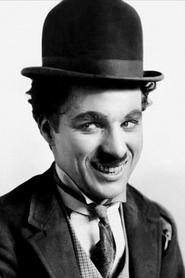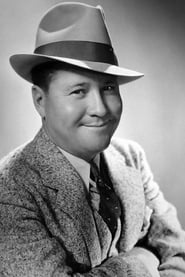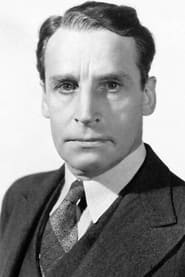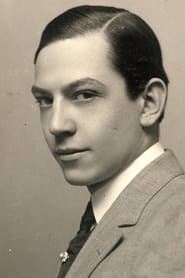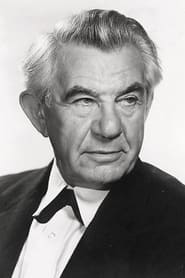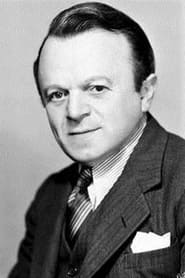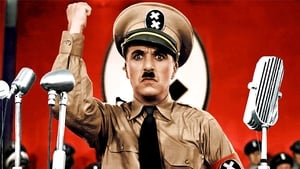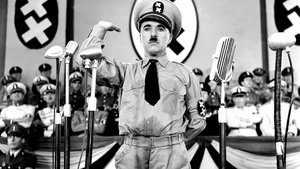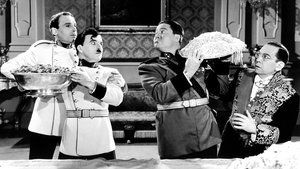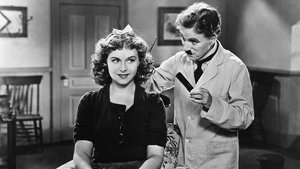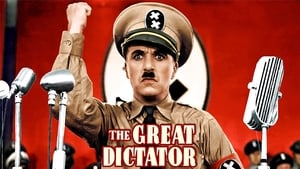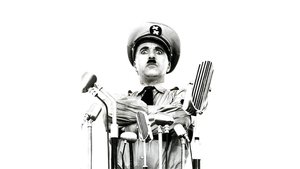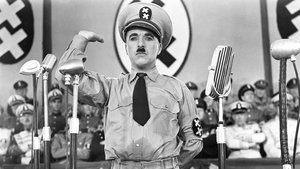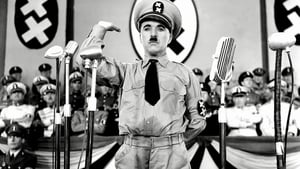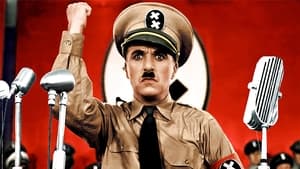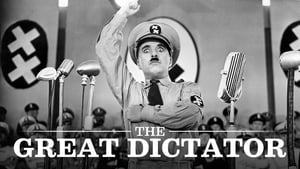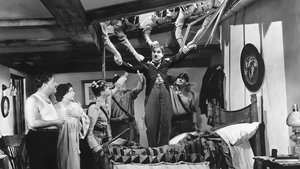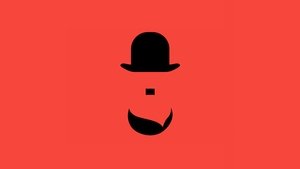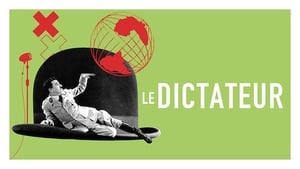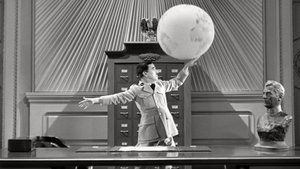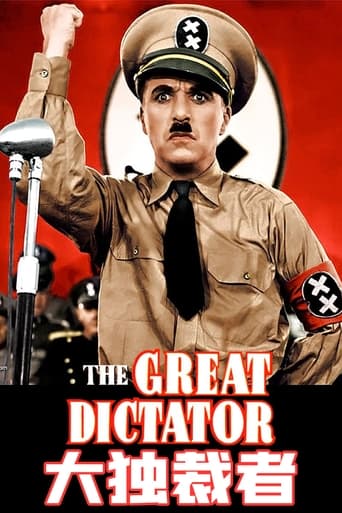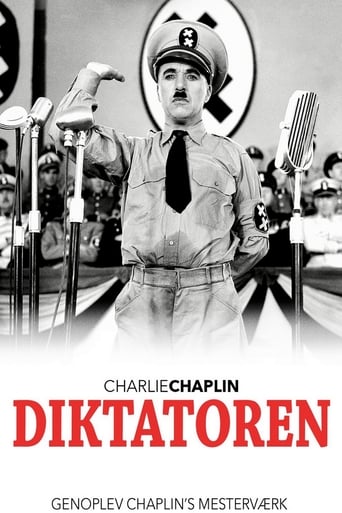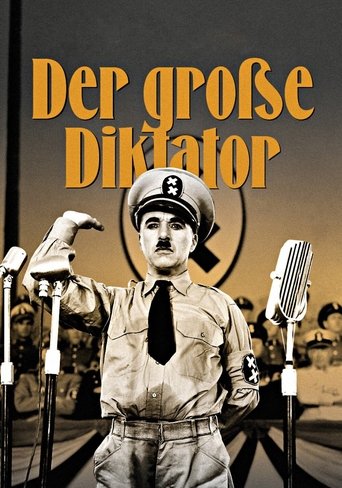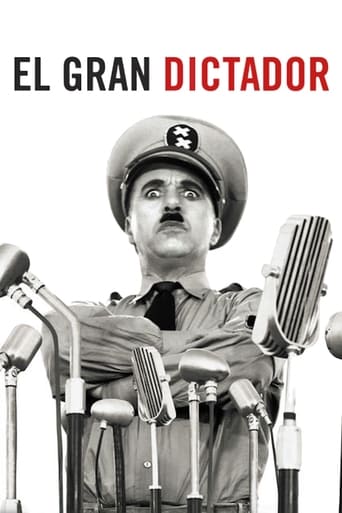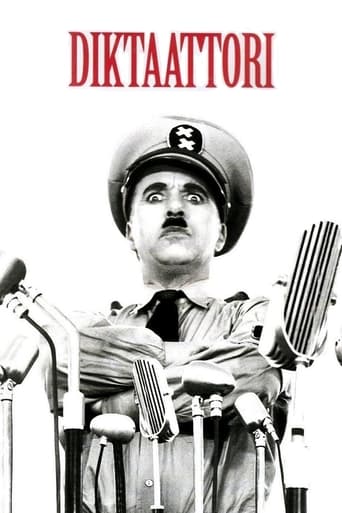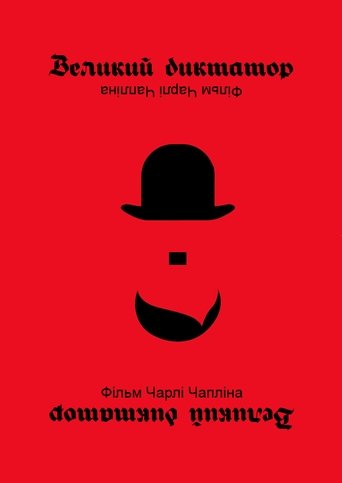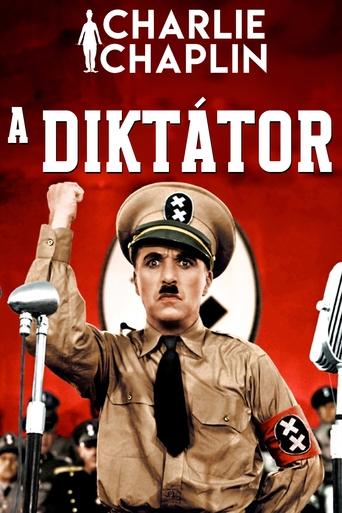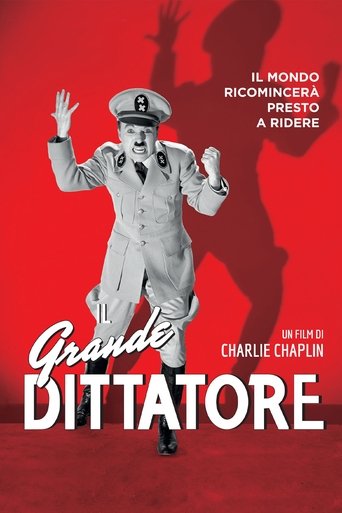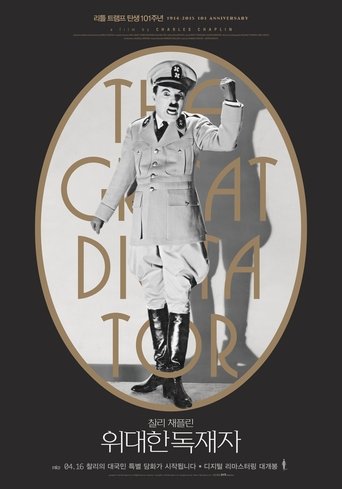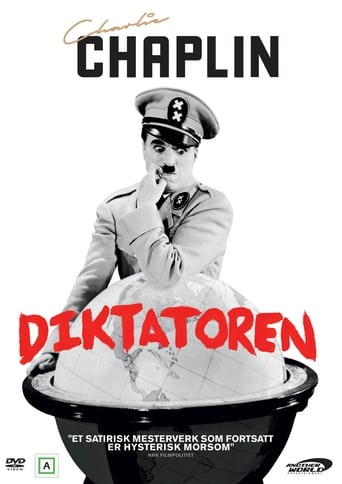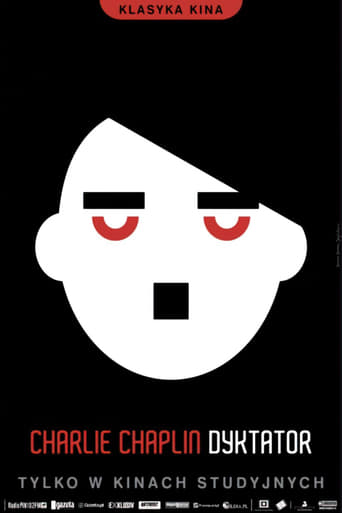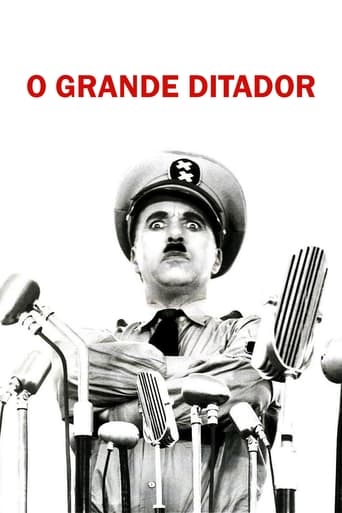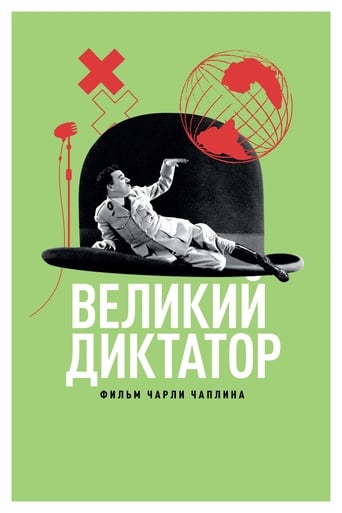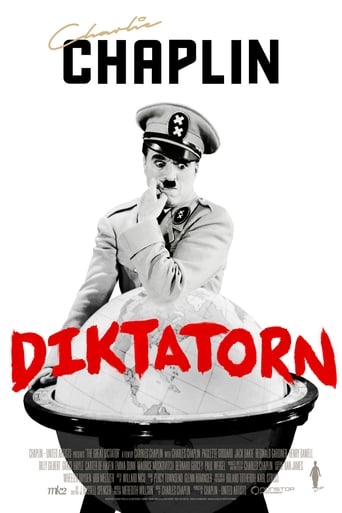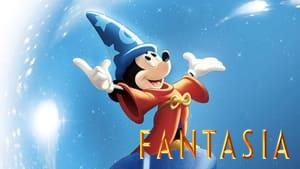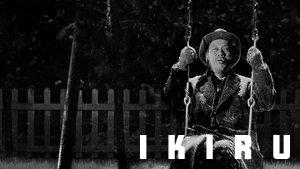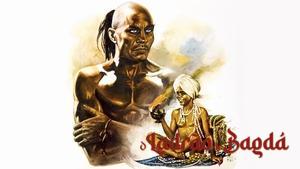
The Great Dictator
Once again - the whole world laughs!
1940 | 125m | English
Popularity: 7 (history)
| Director: | Charlie Chaplin |
|---|---|
| Writer: | Charlie Chaplin |
| Staring: |
| Dictator Adenoid Hynkel tries to expand his empire while a poor Jewish barber tries to avoid persecution from Hynkel's regime. | |
| Release Date: | Oct 15, 1940 |
|---|---|
| Director: | Charlie Chaplin |
| Writer: | Charlie Chaplin |
| Genres: | |
| Keywords | dictator, hairdresser, amnesia, jewish ghetto, propaganda, national socialism, national socialist party, speech, barbershop, fictitious country |
| Production Companies | Charles Chaplin Productions |
| Box Office |
Revenue: $11,000,000
Budget: $2,000,000 |
| Updates |
Updated: Nov 15, 2025 Entered: Apr 13, 2024 |
| Name | Character |
|---|---|
| Charlie Chaplin | Adenoid Hynkel, Dictator of Tomania / A Jewish Barber |
| Paulette Goddard | Hannah |
| Jack Oakie | Benzino Napaloni, Dictator of Bacteria |
| Reginald Gardiner | Commander Schultz |
| Henry Daniell | Garbitsch |
| Billy Gilbert | Field Marshal Herring |
| Grace Hayle | Madame Napaloni |
| Carter DeHaven | Spook |
| Maurice Moscovitch | Mr. Jaeckel |
| Emma Dunn | Mrs. Jaeckel |
| Bernard Gorcey | Mr. Mann |
| Paul Weigel | Mr. Agar |
| Chester Conklin | Barber's Customer |
| Esther Michelson | Jewish Woman |
| Hank Mann | Storm Trooper Stealing Fruit |
| Florence Wright | Blonde Secretary |
| Eddie Gribbon | Tomanian Storm Trooper |
| Rudolph Anders | Tomanian Commandant at Osterlich / Robert O. Davis |
| Eddie Dunn | Whitewashed Storm Trooper |
| Nita Pike | Secretary |
| George Lynn | Commander of Storm Troopers |
| Wheeler Dryden | Heinrich Schtick / Translator (voice) |
| Fred Aldrich | Soldier (uncredited) |
| Richard Alexander | Tomainian Prison Guard in 1918 (uncredited) |
| Sig Arno | Compact Parachute Inventor (uncredited) |
| William Arnold | Tomanian Officer (uncredited) |
| Joe Bordeaux | Ghetto Extra (uncredited) |
| Don Brodie | Reporter from International Press (uncredited) |
| Gino Corrado | Sculptor (uncredited) |
| John Davidson | Hospital Superintendent (uncredited) |
| Max Davidson | Jewish Man (uncredited) |
| Lew Davis | Hospital Orderly (uncredited) |
| Pat Flaherty | Friendly Storm Trooper (uncredited) |
| Bud Geary | Storm Trooper (uncredited) |
| Sam Harris | Officer (uncredited) |
| Eddie Hart | Policeman (uncredited) |
| Leyland Hodgson | Big Bertha Gunnery Officer (uncredited) |
| William Irving | Man Seated on Bed (uncredited) |
| Charles Irwin | Banquet Butler (uncredited) |
| Ethelreda Leopold | Blonde Secretary (uncredited) |
| Torben Meyer | Bald Barbershop Customer (uncredited) |
| Bert Moorhouse | Hynkel's Staff Officer (uncredited) |
| Nellie V. Nichols | Jewish Woman (uncredited) |
| Manuel París | Dance Extra at Ball (uncredited) |
| Jack Perrin | Jewish Man (uncredited) |
| Lucien Prival | Storm Trooper Officer (uncredited) |
| Cyril Ring | Officer Extra (uncredited) |
| Henry Roquemore | Soldier (uncredited) |
| Tiny Sandford | Soldier in 1918 Tomainia (uncredited) |
| Hans Schumm | Soldier (uncredited) |
| Harry Semels | Jewish Fruit Stand Proprietor (uncredited) |
| Charles Sullivan | Prison Guard (uncredited) |
| Carl Voss | Officer (uncredited) |
| Leo White | Hynkel's Barber (uncredited) |
| Harry Wilson | Soldier in Field (uncredited) |
| Hans Conried | Undetermined Role (uncredited) |
| Francis Ernest Drake | Storm Trooper (uncredited) |
| Francesca Santoro | Aggie (uncredited) |
| Leonard Walker | Conductor (uncredited) |
| Finn Zirzow | Soldier (uncredited) |
| Wyn Ritchie Evans | Woman in Crowd (uncredited) |
| James Carlisle | Ball Guest (uncredited) |
| Oliver Cross | Ball Guest (uncredited) |
| Herschel Graham | Soldier (uncredited) |
| Name | Job |
|---|---|
| Karl Struss | Director of Photography |
| Wheeler Dryden | Assistant Director, Second Unit |
| Meredith Willson | Original Music Composer |
| Glenn Rominger | Sound Designer |
| Willard Nico | Editor |
| Edward G. Boyle | Set Decoration |
| Percy Townsend | Sound Designer |
| Ed Voight | Makeup Artist |
| Roland Totheroh | Director of Photography |
| J. Russell Spencer | Art Direction |
| Ralph Hammeras | Special Effects |
| Jack Cosgrove | Visual Effects |
| Buster Wiles | Stunts |
| Ted Tetrick | Costume Supervisor |
| Carmen Dragon | Orchestrator |
| Max Terr | Orchestrator |
| Alfred Reeves | Production Manager |
| William Bogdanoff | Construction Foreman |
| Frank Testera | Electrician |
| Kathleen Pryor | Production Secretary |
| Charlie Chaplin | Screenplay, Original Music Composer, Director |
| Name | Title |
|---|---|
| Carter DeHaven | Associate Producer |
| Charlie Chaplin | Producer |
| Organization | Category | Person | |
|---|---|---|---|
| Academy Awards | Best Director | Charlie Chaplin | Nominated |
| Academy Awards | Best Actor | Charlie Chaplin | Nominated |
| Venice Film Festival | Best Picture | N/A | Won |
Popularity History
| Year | Month | Avg | Max | Min |
|---|---|---|---|---|
| 2024 | 4 | 44 | 77 | 26 |
| 2024 | 5 | 96 | 110 | 77 |
| 2024 | 6 | 65 | 106 | 31 |
| 2024 | 7 | 53 | 82 | 27 |
| 2024 | 8 | 34 | 69 | 19 |
| 2024 | 9 | 24 | 36 | 17 |
| 2024 | 10 | 33 | 58 | 19 |
| 2024 | 11 | 26 | 44 | 19 |
| 2024 | 12 | 23 | 30 | 16 |
| 2025 | 1 | 24 | 43 | 16 |
| 2025 | 2 | 18 | 25 | 4 |
| 2025 | 3 | 8 | 23 | 2 |
| 2025 | 4 | 4 | 7 | 2 |
| 2025 | 5 | 23 | 208 | 2 |
| 2025 | 6 | 4 | 7 | 2 |
| 2025 | 7 | 3 | 4 | 2 |
| 2025 | 8 | 3 | 3 | 2 |
| 2025 | 9 | 3 | 6 | 2 |
| 2025 | 10 | 3 | 5 | 2 |
| 2025 | 11 | 2 | 4 | 2 |
| 2025 | 12 | 2 | 3 | 1 |
| 2026 | 1 | 3 | 4 | 1 |
| 2026 | 2 | 3 | 6 | 2 |
| 2026 | 3 | 7 | 7 | 7 |
Trending Position
| Year | Month | High | Avg |
|---|---|---|---|
| 2025 | 12 | 992 | 992 |
| Year | Month | High | Avg |
|---|---|---|---|
| 2025 | 11 | 474 | 846 |
| Year | Month | High | Avg |
|---|---|---|---|
| 2025 | 10 | 524 | 787 |
| Year | Month | High | Avg |
|---|---|---|---|
| 2025 | 9 | 944 | 957 |
| Year | Month | High | Avg |
|---|---|---|---|
| 2025 | 7 | 786 | 875 |
| Year | Month | High | Avg |
|---|---|---|---|
| 2025 | 6 | 531 | 732 |
| Year | Month | High | Avg |
|---|---|---|---|
| 2025 | 5 | 632 | 795 |
| Year | Month | High | Avg |
|---|---|---|---|
| 2025 | 4 | 646 | 825 |
| Year | Month | High | Avg |
|---|---|---|---|
| 2025 | 3 | 266 | 562 |
| Year | Month | High | Avg |
|---|---|---|---|
| 2025 | 1 | 978 | 978 |
| Year | Month | High | Avg |
|---|---|---|---|
| 2024 | 11 | 965 | 969 |
| Year | Month | High | Avg |
|---|---|---|---|
| 2024 | 10 | 987 | 987 |
In September 1939, six days after Britain declared war on Nazi Germany, Charlie Chaplin began filming his next feature. Drawing on the public perception of the similarities between himself and Adolf Hitler - not just his toothbrush moustache but also their upbringings - Chaplin sought to directly pa ... rody and attack the German führer and fascism. In _The Great Dictator_, Adenoid Hynkel (Chaplin) rules Tomania and sets about his conquest of the world. In doing so, he persecutes Jewish people, including a former veteran of World War I who is now a barber (also Chaplin). Unsurprisingly, the film was a hit on release, resonating well with the anti-Nazi sentiment in both American and British public. Chaplin understood that delivering his political message was so important that he forewent his usual desire for a silent film in order to get his message across. Sound is used to great effect in _The Great Dictator_. By studying many of Hitler's speeches, Chaplin was able to create a ludicrous, yet believable, gibberish parody of the Nazi leader's oratory style. Of course, the physical comedy remains, typically reserved for the barber (who may or may not be Chaplin's silent hero, The Tramp). This combination of physical comedy and irreverent one liners together makes the film feel like a very early Carry On. While _The Great Dictator_ remains arguably Chaplin's best "talkie", it often feels like it is the end of Chaplin's era of classical pantomime. People being hit on the head with a saucepan comes across as a cheap laugh and it is often the verbal jokes that are the cleverest. Overall the comedy has not aged well. But _The Great Dictator_ was never designed for longevity. It was perfect propaganda for the Allies, released at a perfect point in the War. For that reason, The Great Dictator can only be judged in the context of its release.
